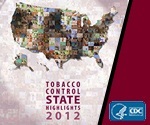Ventilation Does Not Effectively Protect Nonsmokers from Secondhand Smoke
Overview
Secondhand smoke contains more than 7,000 chemicals. Hundreds are toxic, and about 70 can cause cancer.1 In children, secondhand smoke can cause ear infections, more severe asthma, respiratory infections, and sudden infant death syndrome (SIDS).2 In adults who have never smoked, secondhand smoke can cause heart disease and/or lung cancer.2 Establishing a smoke-free environment is the only effective way to protect nonsmokers from secondhand smoke.2,3
Secondhand Smoke Exposure
Separating smokers from nonsmokers, cleaning the air, and ventilating buildings does NOT eliminate secondhand smoke exposure.2
- Conventional air cleaning systems can remove large particles, but not the smaller particles or the gases found in secondhand smoke.
- Current heating, ventilating, and air conditioning systems alone do not control secondhand smoke exposure. In fact, these systems may distribute secondhand smoke throughout a building.
- Even separately enclosed, separately exhausted, negative-pressure smoking rooms do not keep secondhand smoke from spilling into adjacent areas.
The American Society of Heating, Refrigerating and Air-Conditioning Engineers (ASHRAE), the U.S. standard-setting body on ventilation issues, has concluded the following:3
- "The only means of effectively eliminating health risks associated with indoor exposure is to ban smoking activity."
There is no risk-free level of exposure to secondhand smoke. Even low levels of exposure can harm nonsmokers' health.2
(See Health Effects of Secondhand Smoke fact sheet for additional information.)
References
- U.S. Department of Health and Human Services.
A Report of the Surgeon General: How Tobacco Smoke Causes Disease: What It Means to You
 .
(PDF–1.79 MB) Atlanta: U.S. Department of Health and Human Services, Centers for Disease Control and Prevention, National Center for Chronic Disease Prevention and Health Promotion, Office on Smoking and Health, 2010 [accessed 2011 Mar 11].
.
(PDF–1.79 MB) Atlanta: U.S. Department of Health and Human Services, Centers for Disease Control and Prevention, National Center for Chronic Disease Prevention and Health Promotion, Office on Smoking and Health, 2010 [accessed 2011 Mar 11]. - U.S. Department of Health and Human Services. The Health Consequences of Involuntary Exposure to Tobacco Smoke: A Report of the Surgeon General. Atlanta: U.S. Department of Health and Human Services, Centers for Disease Control and Prevention, Coordinating Center for Health Promotion, National Center for Chronic Disease Prevention and Health Promotion, Office on Smoking and Health, 2006 [accessed 2011 Mar 11].
- American Society of Heating, Refrigerating and Air-Conditioning Engineers.
Environmental Tobacco Smoke: Position Document
 .
(PDF–1.85 MB)
Atlanta: American Society of Heating, Refrigerating and Air-Conditioning Engineers, 2010 [accessed 2011 Mar 11].
.
(PDF–1.85 MB)
Atlanta: American Society of Heating, Refrigerating and Air-Conditioning Engineers, 2010 [accessed 2011 Mar 11].
For Further Information
Centers for Disease Control and Prevention
National Center for Chronic Disease Prevention and Health Promotion
Office on Smoking and Health
E-mail: tobaccoinfo@cdc.gov
Phone: 1-800-CDC-INFO
Media Inquiries: Contact CDC's Office on Smoking and Health press line at 770-488-5493.
File Formats: All viewers, players, and plug-ins used on this site can be downloaded from the file formats page. (For example: Adobe Acrobat Reader for pdf files, Windows Media Player for audio and video files, PowerPoint Viewer for presentation slides, etc.)
Contact Us:
- CDC/Office on Smoking and Health
4770 Buford Highway
MS K-50
Atlanta, Georgia 30341-3717 - 800-CDC-INFO
(800-232-4636)
TTY: (888) 232-6348
8am–8pm ET
Monday–Friday
Closed Holidays - tobaccoinfo@cdc.gov




